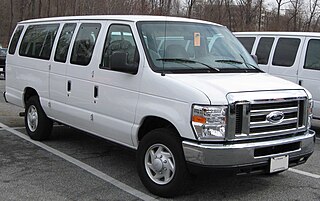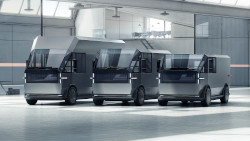
Minivan is a car classification for vehicles designed to transport passengers in the rear seating row(s), with reconfigurable seats in two or three rows. The equivalent classification in Europe is MPV or M-segment.

A van is a type of road vehicle used for transporting goods or people. Depending on the type of van, it can be bigger or smaller than a pickup truck and SUV, and bigger than a common car. There is some variation in the scope of the word across the different English-speaking countries. The smallest vans, microvans, are used for transporting either goods or people in tiny quantities. Mini MPVs, compact MPVs, and MPVs are all small vans usually used for transporting people in small quantities. Larger vans with passenger seats are used for institutional purposes, such as transporting students. Larger vans with only front seats are often used for business purposes, to carry goods and equipment. Specially equipped vans are used by television stations as mobile studios. Postal services and courier companies use large step vans to deliver packages.

The Chevrolet Astro is a van that was manufactured and marketed by the Chevrolet division of American auto manufacturer General Motors from 1985 to 2005. Sold alongside the GMC Safari, the Astro was marketed in multiple configurations, including passenger minivan and cargo van.

The Grumman Long Life Vehicle (LLV) is an American light transport truck model, designed as a mail truck for the United States Postal Service, which has been its primary user since it first entered service in 1987, 36 years ago. It also was used by Canada Post. The LLV uses a chassis built by GM based on the S-10 with an aluminum body built by Grumman.

The Ford E-Series is a range of full-size vans manufactured and marketed by the Ford Motor Company. Introduced for 1961 as the replacement of the Ford F-Series panel van, four generations of the model line have been produced. Marketed for both cargo and passenger transport configurations, the E-Series has been designed with multiple design variations for both retail and commercial sale, including vans, and commercial-grade cutaway van chassis and stripped chassis.

The Chevrolet Express is a series of full-size vans produced by General Motors since 1996. The successor to the Chevrolet G-series van, the Express is produced in passenger and cargo variants. Alongside the standard van body, the line is offered as a cutaway van chassis; the latter vehicle is a chassis cab variant developed for commercial-grade applications, including ambulances, buses, motorhomes, and small trucks.

The Ford Aerostar is a range of vans that was manufactured by Ford from the 1986 to the 1997 model years. The first minivan produced by Ford, the model line was marketed against the Chevrolet Astro/GMC Safari and the first two generations of the Chrysler minivans. Introduced shortly before the Ford Taurus, the Aerostar derived its name from its slope-nosed "one-box" exterior.

The Chevrolet Lumina APV is a minivan that was produced by the Chevrolet division of General Motors. The first front-wheel drive minivan sold by Chevrolet, the Lumina APV was sold in a single generation from the 1990 to 1996 model years. Marketed alongside the Pontiac Trans Sport and Oldsmobile Silhouette, the Lumina APV competed against the Dodge Grand Caravan/Plymouth Grand Voyager, the extended-length Ford Aerostar, and the Mazda MPV.

The Mitsubishi Delica is a range of vans and pickup trucks designed and built by the Japanese automaker Mitsubishi Motors since 1968. It was originally based on a cabover van and pickup truck introduced the previous year, also called the Delica, its name a contraction of the English language phrase Delivery car. This pickup truck, and a commercial van derived from it has received many names in export markets, being sold as the L300 in Europe, Jamaica and New Zealand, Express and Starwagon in Australia, and plain Mitsubishi Van and Wagon in the United States. The passenger car versions were known as Delica Star Wagon from 1979 until the 1994 introduction of the Delica Space Gear, which became simply Space Gear in Europe at least. The most recent version is called the Delica D:5. With the exception of the first, versions of all generations are still being sold in various international markets.

Steer-by-wire, in the context of the automotive industry, is a technology or system that allows steering some or all of a vehicle's wheels without a steering column connected to the wheel axles. It is different from electric power steering or power-assist, as those systems still rely on the steering column to transfer some steering torque to the wheels. It is often associated with other drive by wire technologies.

The Rivian R1T is a battery electric mid-size light duty luxury pickup truck produced by the American company Rivian. The first production R1T rolled off the assembly line in Illinois and was delivered to a customer in September 2021. The official EPA range for the Rivian R1T ranges from 289–352 mi (465–566 km), depending on drivetrain, battery pack capacity and wheel size.

The Tesla Cybertruck is a battery electric full-size pickup truck built by Tesla, Inc. since 2023. The vehicle was introduced as a concept vehicle in November 2019. It is notable for its distinctive triangular body design with flat sheet metal panels made of stainless steel, which has attracted significant controversy.

The Rivian R1S is an all-electric full-size off-road SUV manufactured by Rivian Automotive. Customer deliveries started in 2022. The car took nearly 10 years to develop. Depending on the configuration, it has either two or four electric motors.

Canoo is an American automotive startup based in Torrance, California, that develops and manufactures electric vehicles. Canoo's research & development team is based in the Detroit region while production operations are in Justin, Texas. The company also plans to produce commercial electric vehicles such as vans for fleet, vehicle rental and ride sharing services.
Bollinger Motors is an American automobile manufacturer of electric vehicles based in Oak Park, Michigan.

The BrightDrop Zevo is a battery electric delivery van produced by General Motors for its electric commercial vehicle marque BrightDrop. It was unveiled at the Consumer Electronics Show on 12 January 2021. There are two models, the larger Zevo 600 and the smaller Zevo 400

The Ford F-150 Lightning is a battery electric full-size light duty truck unveiled by Ford in May 2021 as part of the fourteenth generation Ford F-Series. Four models have been announced, and all models initially will be dual-motor, four-wheel-drive, with EPA range estimates of 240–320 mi (390–510 km). A commercial-grade version of the all-wheel drive (AWD) truck is sold in the United States, with higher-power/trim/range models also sold. The F-150 Lightning began production on April 26, 2022.

The Rivian EDV and ECV are a line of battery-electric cargo vehicles built by Rivian. Initially they were exclusive to its investor Amazon, which uses the EDV for package delivery, but in November 2023, sales were opened to other companies as the ECV, with minor cosmetic changes. The EDV and ECV use the RCV platform, which is derived from the R1 platform that underpins the manufacturer's R1T pickup truck and R1S sport-utility vehicles, and is built in three sizes. Specific models include the EDV/ECV-500, EDV/ECV-700, and EDV-900.

The Canoo Multi-Purpose Delivery Vehicle is a line of battery electric delivery vans produced by Canoo, the first of which was unveiled in December 2020. There are three planned models, the MPDV1 and the taller MPDV2, both sharing the same wheelbase and platform as the earlier Canoo Lifestyle Vehicle, and the MPDV3, which will use an enlarged version of the same platform.

The Workhorse C-Series was a line of battery electric medium-duty delivery vans built by Workhorse Group for commercial package delivery company fleets, which entered limited production in 2021, were recalled that September, and were discontinued in 2022 after fewer than fifty were built. The C-Series was originally named the N-GEN when the line was first announced in 2017. N-GEN prototypes began testing in 2018 and were renamed to the C-Series in 2019.
























